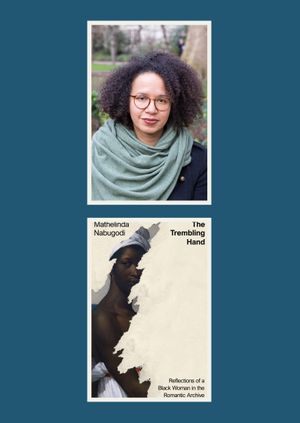
Mathelinda Nabugodi - The Trembling Hand
British Summer Time
at The Heath Bookshop
Tickets
Event Details
We are delighted to be hosting Dr Mathelinda Nabugodi at The Heath Bookshop to discuss her fascinating new book, The Trembling Hand : Reflections of a Black Woman in the Romantic Archive.
This is a stunning book!
Mathelinda will be in conversation with Aarti Kumari from Women Who Redefine Colour Bookclub followed by a book signing.
Dr Mathelinda Nabugodi is a Lecturer in Comparative Literature at University College London. Previously she was a Leverhulme Trust Early Career Fellow in the Faculty of English at the University of Cambridge, where she researched the literary archive of Percy Bysshe Shelley, and a Research Associate in the Literary and Artistic Archive at the Fitzwilliam Museum. She completed her doctorate at UCL, where she was the first person ever to be awarded a PhD in Creative Critical Writing by the university, for her thesis on Shelley and Walter Benjamin.
The Trembling HandWordsworth, Shelley, Byron, Keats – the Romantic poets are titans of English literature, taught and celebrated around the world. Their work is associated with sublime passions, violent stormscapes and a questing search for the inner self. It is rarely associated with the racial politics of the transatlantic slave economy.
But these literary icons lived through a period when individual and collective resistance by Black people in Britain and her overseas colonies was making it increasingly difficult – and increasingly costly – to ignore their demands for freedom. A time when popular support for the abolition movement exploded across the country – and was met by a vehement, reactionary campaign from the establishment. A time when white supremacist ideologies were fomented to justify the abuse and exploitation of non-white 'races'. This cultural context is not immediately obvious in the canon of Romantic poetry. But that doesn’t mean it’s not there.
The Trembling Hand turns an urgent critical gaze onto six major Romantic authors, examining how their lives and works were entangled with the racist realities of their era. Mathelinda Nabugodi pores over carefully preserved manuscripts, travels to the houses where these writers lived and died, examines the personal objects which survived them: a teacup, a baby rattle, a lock of hair. Amid this archive, she searches for traces of Black figures whose lives crossed paths with the great Romantics. And she grapples with the opposing forces of reverence and horror as her fascination with literary relics collides with feelings of sorrow and rage.
